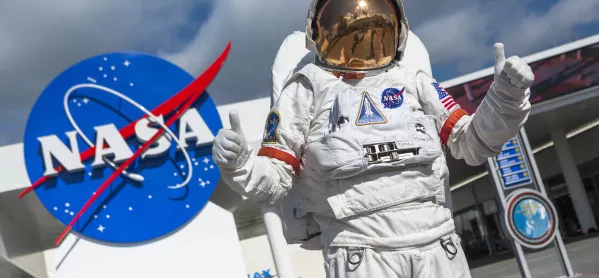“How do I get to work for Nasa?”
It’s a question many pupils ask when they first learn about the possibility of working in space.
Yet this time the question was being asked not to a teacher, but to two speakers from Nasa who had played key roles in the organisation’s Mars Mission and who were now talking to our students via the magic of video conferencing - the second time they had done so in a matter of months.
Of course, developing a connection with two members of Nasa staff did not happen out of thin air, but was the culmination of many connections made over the past two years - and that underlines how schools can harness educational networks to boost pupil opportunities.
The road to Nasa
It started when I first heard the two Nasa experts in question - Richard Davies and Bob Collom - speak at the Climate Action Day conference on 5 November 2021, of which our school was also a participant.
It was a great event and seeing Rick and Bob speak, their engagement with children and their humble and humane nature made me feel confident to contact them - done simply by sending a message on Twitter.
I asked if they had the time and willingness to speak to students in Moldova as part of our Founders’ Lecture series.
This series is run for the 3rd year at Heritage International School, and since the pandemic started, we hold all lectures online, owing to Covid measures in place.
But having them online means also we can extend them globally for guest speakers and invite other schools in Moldova to participate, so that students across the country can benefit from these opportunities - especially as they are excellent career guidance sessions for young people.
Rick and Bob kindly accepted the invitation to speak in January 2022.
A very welcome reception
Needless to say, the Nasa session was the longest Founders’ Lecture session in three years, with the Google Meet room full of hundreds of teachers and students listening and asking questions.
We promoted the event on social media, too, and soon after this, we were contacted by the British Council, who wanted details about the event and asked if it was possible to invite the Nasa experts to inspire the British Council School Ambassadors conference.
Nasa accepted, but they wanted to invite some students to join as well, to keep the same format as the Founders’ Lectures - which we of course were only too happy to agree to. I selected several students who had been unable to make the Founders’ Lecture session to join the event.
It was a great event again with plenty of engagement from students, and Rick and Bob did a great job showing the link between what Nasa does and the need for people with a raft of skill sets - not just around Stem but also arts, humanities and languages.
You could see our students connecting to this, and realising how what they learn could lead to such roles in the future.
There was also a real emphasis on the importance of sustainability, preserving our planet, global citizenship and how space is bigger than any nation and the potential next chapter in humanity’s story.
Beyond inspiring students, the event also helped create a link between Nasa and the British Council, which has now established a platform for further work to be done collaboratively, so schools in the UK get to have similar experiences in their approach to learning from and with the Nasa experts.
Let’s look to the stars
Of course, schools have always been great at creating these sorts of connections with guest speakers and major organisations. But the pandemic has shrunk our worlds somewhat, with many opportunities for travel, events and trips curtailed.
But through digital platforms, engagement with the sector and the willingness to simply ask people “Could you chat to our students?”, it is clear that fantastic collaborative opportunities can be achieved - and open students’ eyes to their futures with links to what they are studying now.
Certainly for us as an international school, the engagement we have seen in our students from all nations to the work of Nasa and what Rick and Bob were able to chat about underlines that space still retains that mix of wonder, mystery and excitement that never fails to capture the imagination.
Perhaps the ambition for schools in the 2020s shouldn’t just be international education but to add an interstellar educational dimension as well.
Tatiana Popa is an English and global perspectives teacher and the head of global education at Heritage International School in Moldova





